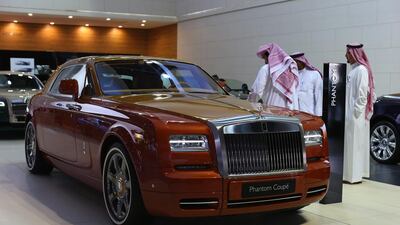The number of people in the UAE who have a fortune of more than US$30 million fell slightly last year as a slump in oil prices and global economic volatility took their toll on the country’s wealthy.
The property consultant Knight Frank, which tracks super-wealthy people around the world – people with net assets of more than $30m excluding their principal residence – found that the ranks of the rich in the UAE fell last year to 1,380 from 1,392 in 2014.
According to the Knight Frank figures, the 0.8 per cent fall, which equates to 12 individuals falling out of the category, is a blip in a trend towards more and more of the world’s super-rich flocking to Dubai and Abu Dhabi.
It found that the number of wealthy people in the country is expected to almost double to 2,025 in 2025 as more of the world’s super-rich buy homes in the country’s two biggest cities.
Overall, Knight Frank found that the number of super-wealthy people in the world fell 3 per cent last year as nearly 6,000 people dropped out of the wealth bracket because of the fall in oil prices, the economic crisis in China and global stock market volatility.
Azerbaijan was the country with the greatest increase over the past 10 years, according to the report, with a total increase of 444 per cent. Vietnam was the country forecast to have the greatest increase in numbers of the super-wealthy over the next 10 years, with a predicted increase of 140 per cent.
Knight Frank found that the global population of super-wealthy people has grown by 61 per cent over the past decade to 187,500 and is predicted to grow another 41 per cent to 263,500 by 2025. A slump in the oil price and slowing economic conditions also meant that UAE cities languished near the bottom of a table of global property price movements. According to the report, prime house prices in Dubai sank by 5.5 per cent last year, while in Abu Dhabi they fell by 2 per cent.
“Over the last decade, Dubai’s economy has evolved significantly on modern infrastructure and business-friendly regulations,” said Dana Salbak, the head of Mena research at Knight Frank.
“The city has emerged as a global hub for financial services, logistics, hospitality and trade, making it a popular destination for people to live, invest, educate their children, network and spend their leisure time.”
Earlier this week, a Cluttons survey found that Dubai remains the most popular destination in the GCC for super-wealthy investors who own at least $1m outside their city of residence, followed by Abu Dhabi and Sharjah.
It said that it expected Dubai property values to drop by a further 5 per cent this year.
lbarnard@thenational.ae
Follow The National's Business section on Twitter

